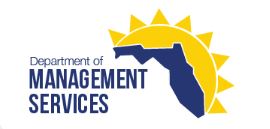Florida SLERS renewal could wait until May as SLERS-2 procurement begins
Florida agencies that depend on the State Law Enforcement Radio System (SLERS) for mission-critical voice communications will be able to maintain access to the system, but the longstanding maintenance agreement is expected to end when the current contract with L3Harris expires at the end of June, state officials said today.
Patrick Gillespie, deputy secretary of business operations for the Florida Department of Management Services (DMS), said state officials are meeting with L3Harris representatives to renew the existing SLERS contract that expires at the end of June and resolve a SLERS tower dispute with the vendor. L3Harris actually submitted a contract-renewal offer to the state at the end of January, he said.
“We did receive an offer at the end of last month that we’re reviewing, and we continue working with our partners downtown on our funding needs for the system,” Gillespie said today during a meeting of board Florida Joint Task Force (JTF) board that provides advice about SLERS.
“I want to reiterate that [ensuring that] our customers—you, your staff and others—have continuous access to this critical system is a top priority for us.”
Col. Gene Spaulding, chairman of the Florida Joint Task Force board and director of the Florida Highway Patrol (FHP), asked about the timing of possible SLERS renewal, describing it as “probably the most critical piece of information that we’re seeking” as the current contract with L3Harris expiring in about four months.
Gillespie indicated that a SLERS renewal likely would not be finalized during the upcoming session of the Florida Legislature, which is scheduled to convene from March 2 to April 30.
“We’re going to continue to work through the legislative process and continue to have those conversations on needs for the system,” Gillespie said. “I anticipate that we’re going to need through the legislative session to continue having those discussions.
“I don’t think I will have an answer for you in the immediate future, but I hope that—as we continue having those conversations—we’ll get some additional information and we will be able to pass that along. I am committed information and updates to this body, as we’ve been doing.”
As he has during previous JTF meetings, Spaulding stressed the importance of getting the SLERS contract renewal with L3Harris finalized and for state lawmakers to provide the funding necessary for state agencies to purchase new radios that can operate on the aging EDACS platform that is the technological backbone for the current SLERS.
“I know that this sounds like a broken record … but probably one of the most critical issues that we have presenting itself at this point is ensuring that we have a functional system come July 1—not only for officer safety but for the public’s safety,” Spaulding said. “We all know how importation communication is.
“Speaking from FHP’s perspective, our radios are extremely old. Obviously, we’ll be losing the maintenance piece of this contract in July, so it’s very critical for us to be able to secure funding for these new radios.”
Extending the useful life of the current SLERS—the last network still using its particular type of EDACS LMR technology—is crucial to Florida agencies, because it likely will be several years before the radio system is replaced.
On Feb. 16, DMS officials released its Invitation to Negotiate (ITN), which represents the initial tangible step in the second effort to procure SLERS-2, a new statewide network that is expected to provide mission-critical communications via “P25 Phase 2 delivery methodology,” as well as integrate “with broadband network and push-to-talk services,” according to the ITN document. The project is expected to be the largest public-safety communications contract in years, according to industry sources.
Vendors are required to submit their bid by May 11, with the state negotiation team slated to recommend an award to a vendor on Nov. 9, the ITN states. The anticipated contract start date is Dec. 14, according to the procurement document.
According to the SLERS-2 business case prepared by Federal Engineering, the best-case scenario for SLERS-2 calls for the system to be operational during the latter half of 2026.
This SLERS-2 procurement became necessary after Motorola Solutions was selected in March 2018 to build the statewide P25 system for $687.8 million but failed to reach a contract agreement with the state of Florida. In January 2020, DMS announced that it ended talks with Motorola Solutions after the LMR giant declined to sign a contract based on the terms of its bid, according to a state official.
At the time, Florida DMS Secretary Jonathan Satter wrote in a letter to Motorola Solutions that Florida DMS would “move toward the new procurement of a next-generation system”
Most sources familiar with the failed Motorola Solutions talks indicated that biggest sticking point in the negotiations was a “termination for convenience” clause, which would let the state to back out of the potential 20-year deal whenever it wanted with little advance notice. All vendors seeking the P25 contract were required to accept this condition during the bidding process, but Motorola Solutions would not accept it as part of the contract with the state, according to a letter from Satter.
This “termination for convenience” language was not included in the SLER-2 ITN that was issued last week. However, such a clause was not included in the 2016 ITN document for SLERS-2 either, so the possibility still exists that it could be a requirement for interested bidders in this SLERS-2 procurement.
Another problem cited in the failed negotiations with Motorola Solutions was the fact that there was not a clear way for a new vendor to get access to the existing SLERS tower sites—owned by L3Harris—prior to the existing contract expiring on June 30. Resolving this tower issue is being included in the negotiations that DMS officials are having with L3Harris about the SLERS contract renewal, Gillespie said.















